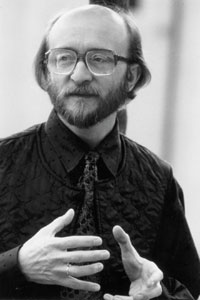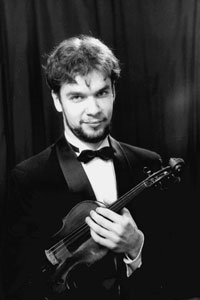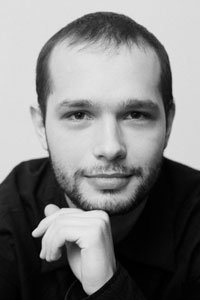In the program:
Galina Ustvolskaya. Trio for violin, clarinet and piano
Alban Berg. Four pieces for clarinet and piano, Op. 5
Anton Webern. Variations for piano, Op. 27
Arnold Schoenberg. Fantasy for violin and piano, Op. 47
Arvo Pärt. Mirror in the Mirror for clarinet and piano
Valentin Silvestrov. Post Scriptum (sonata for violin and piano)
Béla Bartók. Contrasts. Trio for violin, clarinet and piano
 | Alexei Lyubimov (piano) |
 | Alexander Trostiansky (violin)
Alexander Trostiansky is a graduate of the Moscow State Conservatoire (class of Irina Bochkova). He has participated in the festivals Moscow Autumn, December Evenings, Musik im Michel (Hamburg) and the International Oleg Kagan Festival (Kreuth, Germany) among others. He has made numerous recordings with Radio-1 Orpheus Radio as well as producing CDs with Vista Vera, Chandos, Dowani, Egan Records and Naxos. Alexander Trostiansky’s appearances have taken him to cities throughout Russia and across the world. His repertoire includes over twenty violin concertos, a huge range of chamber music and works by 20th century composers, many of which are dedicated to him.
Alexander Trostiansky frequently appears with such musicians as Alexei Lyubimov, Alexander Rudin, Natalia Gutman, Yuri Turovsky, Alexander Melnikov, Natalia Trull and Rustam Komachkov. |
 | Kirill Rybakov (clarinet)
Kirill Rybakov graduated with honours and the gold medal from the Paris Conservatoire before undertaking a postgraduate study at the Moscow State Tchaikovsky Conservatoire and subsequently the Hochschule fьr Musik Freiburg (Germany). As a soloist and chamber ensemble performer, he has appeared with musicians such as Alexei Lubimov, Terry Riley, Marielle Nordmann, Alexander Rudin, Andres Mustonen and Alexei Volodin. He has taken part in the festivals December Evenings, Potsdam Sanssouci, the Berlin Philharmonic Festival, the Schleswig Holstein Festival, the Oleg Kagan in Kreuth Memorial Festival (Germany), the Kuhmo Chamber Music Festival (Finland), the Utrecht Early Music Festival (Netherlands), the Tallinn Baroque Music Festival, Culturscapes (Basel) and the ECLAT festival of contemporary music to name but a few. Since 2003 Kirill Rybakov has taught clarinet at the Moscow Conservatoire. |
| |
This trio, created on the initiative of renowned pianist Alexei Lyubimov, brings together highly diverse musicians, each of them vivid and unique artists. Alexei Lyubimov is famed for his original readings of classical and baroque works, while Alexander Trostyansky is closer to late romantic music and Kirill Rybakov is drawn to contemporary 20th century music and jazz. However, to equal degree all these musicians are known for their renditions of works by contemporary composers and 20th century classics including Bartók, Stravinsky and the New Viennese School.
In 2006 the ensemble recorded a disc called Misterioso (ECM, Munich). The CD includes works by Valentin Silvestrov, Arvo Pärt and Galina Ustvolskaya. This event drew a huge public response, receiving great acclaim from the press and serving as a spur for future recitals by the ensemble.
Today, the trio frequently tours throughout Russia as well as to Belgium, the Netherlands, Spain and Germany.
Berg was an inspired lyricist who in the 20th century retained that romantic cult of emotion common to that of the past 19th century. Waves of lyrical highs and lows, the pointed expression of the strings, the intonational tension, the song, the intense multitude of expressive nuances, all together this creates the specific sound of his music, and this fullness of lyricism is a foil to hopelessness, grotesque and tragedy.
While Anton von Webern was alive... he was, in the public conscious, a freak or some bizarre quirk. A freak because of the short nature of most of his works, a briefness that shocked as it left audiences alone in silence before they had the chance to grasp anything; because of its aphoristic structure, this music refuses to accompany him along the path of specifically sensual and highly detailed contexts... Webern´s idea was that of total lyricism: an attempt to open up all the materiality of music in the pure sound of the subject, all the objective parts of the musical structure, so that nothing remains that is contrary to the subject, alien to it, not assimilated by it.
Arnold Schoenberg entered the history books of 20th century music as the creator of the twelve-tone composition system. But the significance and scale of the great Austrian´s work is much greater than this alone. Schoenberg’s talent was extremely broad in nature. He was a brilliant tutor, training an entire plethora of contemporary musicians such as the great Anton Webern and Alban Berg (together with their teacher they founded the so-called New Vienna School)... Schoenberg´s work is closely connected to musical expressionism. In it one can observe that tension of suffering and sharpness of reaction to the surrounding world that characterised many contemporary artists working in an atmosphere of alarm, foreseeing, too, terrifying social cataclysms... Arguably, the closest analogy to Schoenberg´s personality is that of his countryman and contemporary Franz Kafka. Just as in Kafka´s novels and novellas, in Schoenberg´s music, too, the intensified perception of life at times condenses to form feverish delusions, refined lyricism bordering alongside the grotesque, turning into a living spiritual nightmare.
Galina Ustvolskaya (1919–2006)
was a graduate of the Leningrad Rimsky-Korsakov Conservatoire (composition class of Dmitry Shostakovich). Ustvolskaya´s music is unique and in the literal sense unlike anything else – it is extremely dramatic, wild and filled with tragic pathos through ascetically expressive means.
The composer´s main sphere of creativity was chamber instrument music (although, as Ustvolskaya herself stated, her works are "not chamber music even if it is a solo sonata"). Her works include Cello Sonata No 1, six piano sonatas, five symphonies (the Second, Third and Fourth to texts by 11th century German monk and musician Herman der Schwache), Composition No 1 Dona nobis pacem for piccolo, tuba and piano, Composition No 2 Dies irae for eight double basses, percussion and piano and Composition No 3 Benedictus, qui venit for four flutes, four bassoons and piano.
Galina Ustvolskaya was a recipient of the Heidelberg Prize for achievements in the arts (1992).
Arvo Pärt (1935–) is an Estonian composer. In 1963 he graduated from the Tallinn Conservatoire, having specialised in composition. In his early works he followed the aesthetic norms of realism, but soon he turned to the serial technique (Perpetuum mobile) and the technique of collage (Symphony No 2, Pro et contra for cello and orchestra). Starting in the 1970s, Arvo Pärt has taken a profound interest in the study of Gregorian chant and medieval polyphony, which to a great extent defined the future path of his emergence as a composer.
In the mid 1970s the composer came to a new style based on incredibly simple sound elements – triads and movements across tones of a diatonic scale; Arvo Pärt called it tintinnabuli (from the Latin tinnabulae, of bells) and characterised it as "running headlong into poverty". The first works written in the style include Arbos, Fratres, Summa, Tabula Rasa and Cantus in memory of Benjamin Britten brought Arvo Pärt world fame and are extremely widely performed across the globe, including in various later versions also by the composer. Pärt developed the tintinnabuli style in numerous scores imbued with an elevated, religious spirit. The most significant are Pan intervallo for four block flutes or organ, De profundis for male chorus and organ, Passio Domini Nostri Jesu Christi Secundum Joannem (the St John Passion to Latin text) for soloists, chorus, four instruments and organ, Stabat Mater for three voices and string trio, Te Deum for three choruses, strings and tape-recorder, Magnificat, Mother of God and Virgin for chorus a cappella, the Berlin Mass for chorus and organ or strings and Canon of Repentance for chorus a cappella.
Valentin Silvestrov is a People´s Artist of Ukraine and recipient of the Sergei Kusevitsky and Taras Shevchenko Prizes. Graduated from the Kiev State Tchaikovsky Conservatoire in 1963 (composition class of Boris Lyatoshinsky).
The composer is generally associated with avant-garde movements in contemporary music. The full range of avant-garde means appear in his Third Symphony (Eschatophony), Mystery for alto flute and percussion and Elegy for piano. To a significant degree, the extravagant nature of Silvestrov´s works was conditioned by the techniques of instrumental theatre (Drama for violin, cello and piano and Meditation for cello and chamber ensemble). A new stage in the composer´s career opened when he turned to the "metaphysical" style within new traditionalism and neo-romanticism – works such as Kitsch Music for piano, the vocal series Quiet Songs and cantatas and vocal cycles to classical poetry.
Despite the fact that Valentin Silvestrov´s career has been accompanied by sharp controversy, his music has won great acclaim both in Russia and abroad. Silvestrov´s works have been performed with great success in the USA, the UK, the Netherlands, Finland and Germany and have been published by leading European and American companies including Hans Sikorski, Boosey & Hawkes, G. Schirmer Inc, Ricordi, Universal Edition, Nouvelle Société and Peters.

